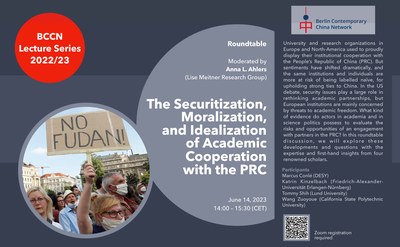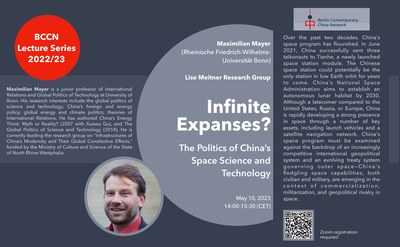Neuigkeiten
20.06.2023 BCCN Talk "Asiatische Diaspora & Cross-Community Solidarität"
- https://www.iaaw.hu-berlin.de/de/ostasien/neuigkeiten/aktuelle-termine/20-06-2023-bccn-talk-asiatische-diaspora-cross-community-solidaritaet
- 20.06.2023 BCCN Talk "Asiatische Diaspora & Cross-Community Solidarität"
- 2023-06-20T16:15:00+02:00
- 2023-06-20T17:45:00+02:00
- Wann 20.06.2023 von 16:15 bis 17:45
- Wo Online via Zoom
- Name des Kontakts Daniel Fuchs
-
iCal
Liebe Studierende, liebe Kolleg:innen,
wir möchten Sie herzlich zum BCCN Talk "Asiatische Diaspora & Cross-Community Solidarität" von Dr. Kimiko Suda (TU Berlin) einladen.
Der Vortrag findet statt als Teil des Seminars "Orientalismus, antiasiatischer Rassismus und der Aufstieg Chinas" von Daniel Fuchs am IAAW der HU Berlin.
Zeit: 20. Juni 2023, 16:15 Uhr - 17:45 Uhr
Ort: Online via Zoom
Dr. Kimiko Suda ist promovierte Sinologin und arbeitet an der Technischen Universität Berlin aus wissenssoziologischer Perspektie zu institutionellem Rassismus im urbanen Raum. Ihre Arbeitsthemen sind (Post)migrant:innen in China und Deutschland, asiatisch-diasporische Selbstorganisierung und (kulturelle) Selbstrepräsentation aus einer queerfeministischen Perspektive, Rassifizierungsprozesse und rassistische Wissensbestände, soziale Gerechtigkeit im Kontext sozialen Wandels. Sie ist ehrenamtlich bei korientation e.V. zu dekolonialer/antirassistischer Erinnerungskultur tätig.
Für die Teilnahme ist eine Registrierung auf Zoom nötig: https://hu-berlin.zoom.us/meeting/register/u5wpf-yhqDIoGNDxK6GHBqzDy2ioyhLPTJMR
Herzliche Grüße,
Daniel Fuchs
Interview von Daniel Fuchs anlässlich des Jahrestags der gewaltvollen Niederschlagung der Tiananmen-Bewegung von 1989
Anlässlich des Jahrestags der gewaltvollen Niederschlagung der Tiananmen-Bewegung von 1989 hat die Öffentlichkeitsabteilung der HU Berlin unseren Kollegen Daniel Fuchs interviewt. Bei Interesse finden Sie das entsprechende Interview zur historischen Einordnung der Proteste und der Erinnerungskultur in der VR China auf der HU-Homepage.
14.06.2023 BCCN Roundtable: "The Securitization, Moralization, and Idealization of Academic Cooperation with the PRC"
- https://www.iaaw.hu-berlin.de/de/ostasien/neuigkeiten/aktuelle-termine/14-06-2023-bccn-roundtable-the-securitization-moralization-and-idealization-of-academic-cooperation-with-the-prc
- 14.06.2023 BCCN Roundtable: "The Securitization, Moralization, and Idealization of Academic Cooperation with the PRC"
- 2023-06-14T14:00:00+02:00
- 2023-06-14T15:30:00+02:00
- Wann 14.06.2023 von 14:00 bis 15:30
- Wo Online via Zoom
- Name des Kontakts Sarah Eaton
-
iCal
Dear students and colleagues,
You are cordially invited to the final talk in the BCCN Online Lecture Series 2022/23 "China – The New Science Superpower?":
Roundtable: The Securitization, Moralization, and Idealization of Academic Cooperation with the PRC
Marcus Conlé (DESY)
Katrin Kinzelbach (Friedrich-Alexander-Universität Erlangen-Nürnberg)
Tommy Shih (Lund University)
Wang Zuoyoue (California State Polytechnic University)
June 14, 2023, 2:00 p.m. – 3:30 p.m. (CET)
A few years ago, university and research organizations in Europe and North-America proudly displayed their academic relations and institutional cooperation with the People’s Republic of China (PRC) as an asset and an achievement. Sentiments now, however, seem to have shifted dramatically, and the same institutions and individuals are more at risk of being labelled naïve, and in some cases unprincipled, in public discourse, for upholding strong ties to China. While in the US debate, security issues play the biggest role in rethinking academic partnerships and research cooperation, in Europe, institutions are so far mainly concerned by threats to academic freedom, it seems.
What caused these shifts? What different perspectives are there in the debate? What kind of evidence do actors in academia and in science politics possess to evaluate the situation and gauge the risks and opportunities of an engagement with partners in the PRC? What recalibrations have already been tried? And is this now really a new phase in global science relations, or are these normal oscillations under the influence of geopolitical dynamics? In this roundtable discussion, we will explore these developments and questions with the expertise and first-hand insights from four renowned scholars and seek to identify nuances in what seems to be an otherwise increasingly polarized debate.
Register for the event here: https://zoom.us/j/91890610657?pwd=SVpxbkZWQ3ZrNlhIWHlQSnZXRzR2UT09
Kind regards
Anna Ahlers, Sarah Eaton
02.06.2023 Guest Lecture Dr. Beril Ocaklı “Re/searching connections. Geopolitics and poetics of the BRI infrastructure in Eurasia”
- https://www.iaaw.hu-berlin.de/de/ostasien/neuigkeiten/aktuelle-termine/02-06-2023-guest-lecture-dr-beril-ocakli-re-searching-connections-geopolitics-and-poetics-of-the-bri-infrastructure-in-eurasia201d
- 02.06.2023 Guest Lecture Dr. Beril Ocaklı “Re/searching connections. Geopolitics and poetics of the BRI infrastructure in Eurasia”
- 2023-06-02T12:15:00+02:00
- 2023-06-02T13:45:00+02:00
- Wann 02.06.2023 von 12:15 bis 13:45
- Wo Invalidenstraße 118, R507
- Name des Kontakts Sarah Eaton
-
iCal
Dear students and colleagues,
You are cordially invited to participate in the guest lecture of Dr. Beril Ocaklı during the BRI seminar on 02.06.2023: “Re/searching connections. Geopolitics and poetics of the BRI infrastructure in Eurasia”
Dr. Beril Ocaklı is Researcher at the Centre for East European and International Studies (ZOiS)
A decade on, China through the Belt and Road Initiative (BRI) continues to occupy minds and political geographies. Unveiled a decade ago at the Nazarbayev University Campus in Astana, Kazakhstan, the BRI remains an unprecedented undertaking for seamlessly interconnecting people and places in Asia with Africa and Europe through multifarious large-scale infrastructure. Drawing on published work and reflections on ongoing research, Beril Ocaklı situates linear takes on the BRI as both mystical and alarmist, and lays bare the initiative’s shapeshifting nature in Central Asia and the South Caucasus. Informed by the interdisciplines of critical geography, anthropology and political economy, the talk grounds and demystifies the geopolitical ‘giant’ in two specific geographical sites and political contexts along the Middle Corridor: (1) the re/construction of the 51 km of the Rikoti Highway in Georgia, literally constituting the Corridor, and (2) the 100 MW Zhanatas Wind Park in Kazakhstan, the largest to date in Central Asia. Juxtaposing the (geo)politics and poetics of the BRI infrastructure with lived dis/connections, the lecture proposes a conversation around infrastructure and democratic governance within and beyond the BRI.
10.05.2023 BCCN Lecture: "Infinite Expanses? The Politics of China’s Space Science and Technology"
- https://www.iaaw.hu-berlin.de/de/ostasien/neuigkeiten/aktuelle-termine/10-05-2023-bccn-lecture-infinite-expanses-the-politics-of-china2019s-space-science-and-technology
- 10.05.2023 BCCN Lecture: "Infinite Expanses? The Politics of China’s Space Science and Technology"
- 2023-05-10T14:00:00+02:00
- 2023-05-10T15:30:00+02:00
- Wann 10.05.2023 von 14:00 bis 15:30
- Wo Online via Zoom
- Name des Kontakts Sarah Eaton
-
iCal
You are cordially invited to participate in BCCN/LMRG's monthly online series “China – The New Science Superpower?”:
Infinite Expanses? The Politics of China’s Space Science and Technology
Speaker: Maximilian Mayer (Rheinische Friedrich-Wilhelms-Universität Bonn)
Online via Zoom: Please register for the event here: https://zoom.us/j/93125029289?pwd=K0s1M1Vsdm1pazBNeTVWRDRwQXZ4UT09
Over the past two decades, China's space program has flourished. In June 2021, China successfully sent three taikonauts to Tianhe, a newly launched space station module. The Chinese space station could potentially be the only station in low Earth orbit for years to come. China's National Space Administration aims to establish an autonomous lunar habitat by 2030. Although a latecomer compared to the United States, Russia, or Europe, China is rapidly developing a strong presence in space through a number of key assets, including launch vehicles and a satellite navigation network. China's space program must be examined against the backdrop of an increasingly competitive international geopolitical system and an evolving treaty system governing outer space—China's fledgling space capabilities, both civilian and military, are emerging in the context of commercialization, militarization, and geopolitical rivalry in space.
Spread the word and register for more lectures in this series on our BCCN-website
Kind regards
Anna Ahlers, Sarah Eaton





